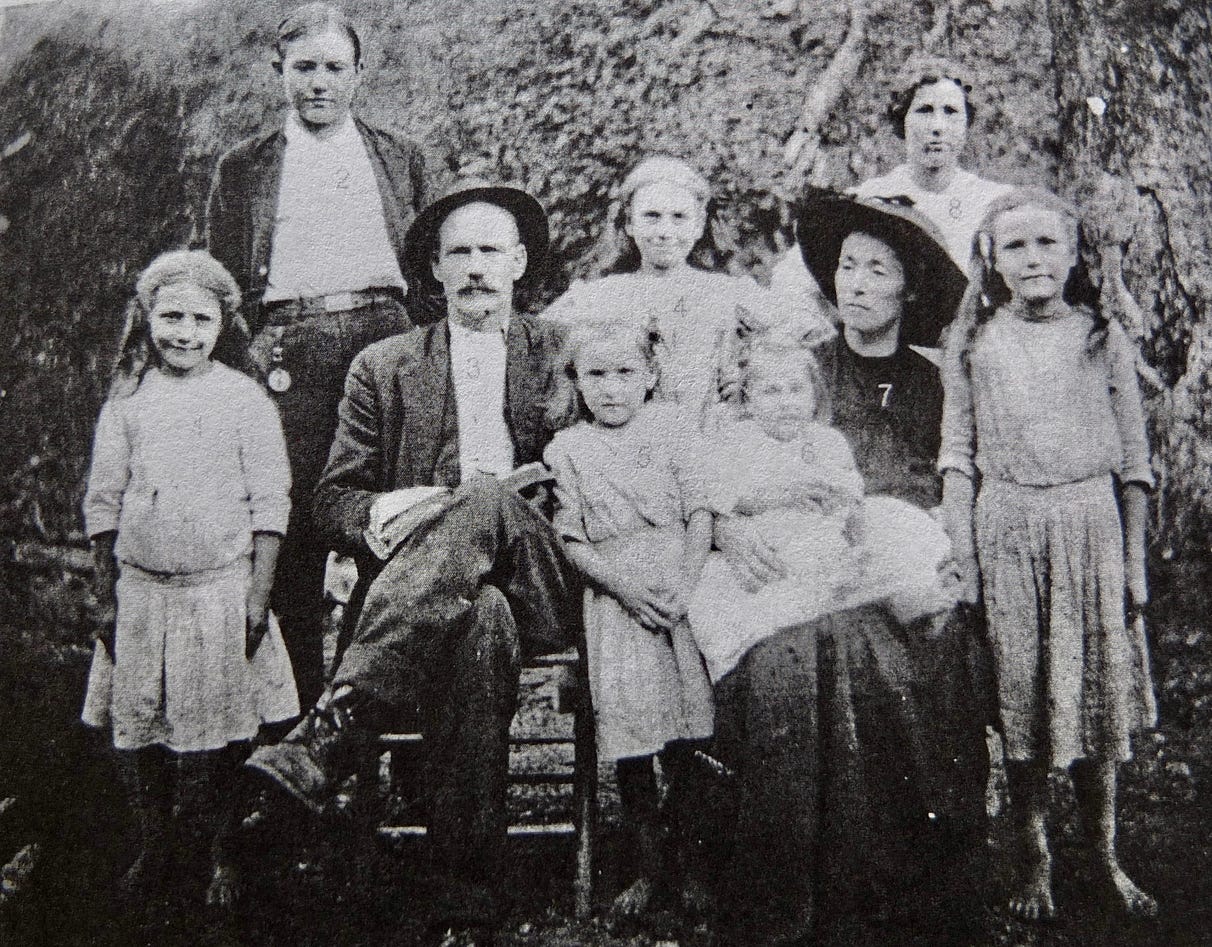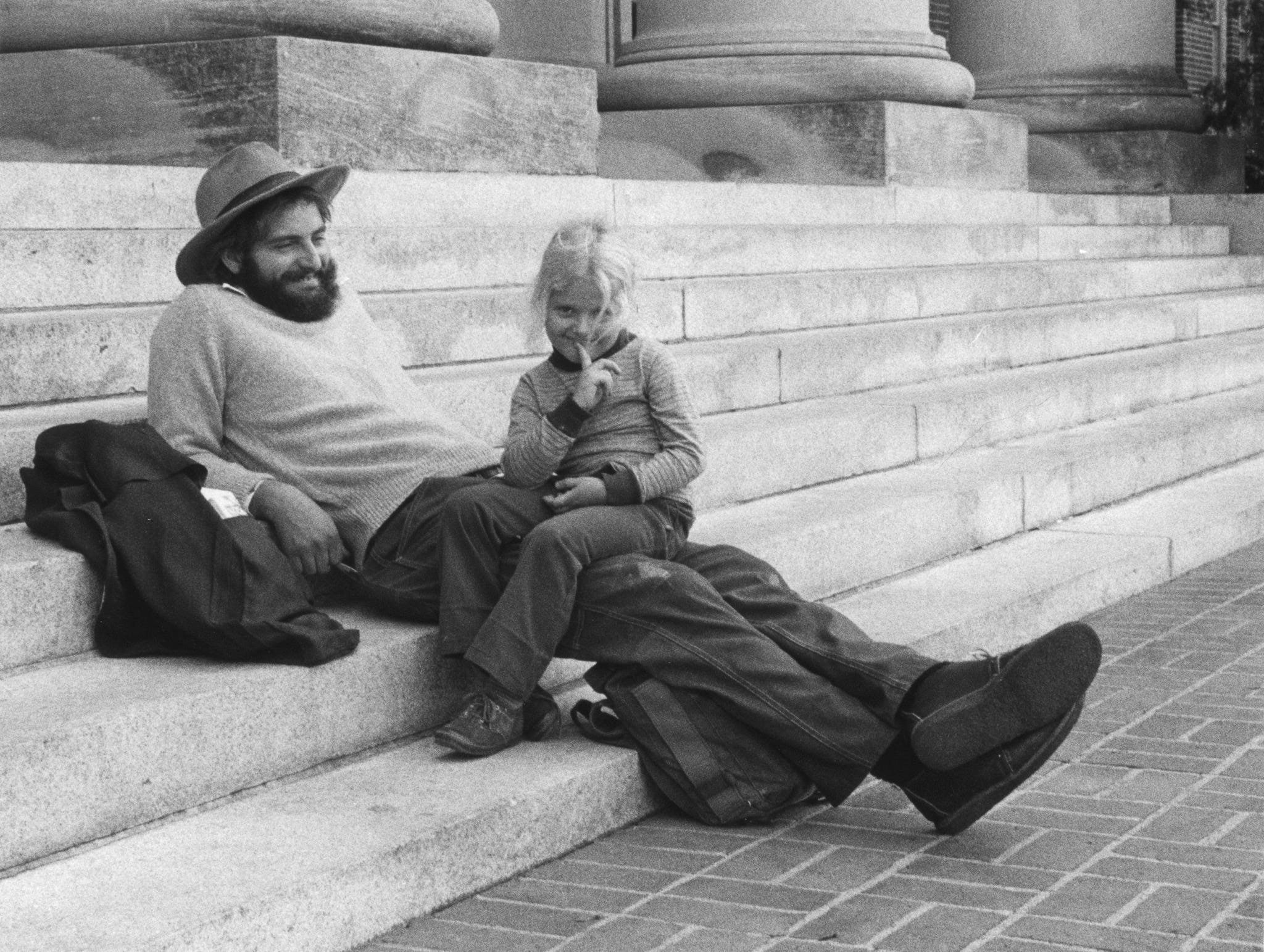The Apple Tree Church
I’m still writing down the testimonies of our Appalachian family. These are about murder, gingerbread, washing day, quilts, saving, singing, and a bunch of children making a church among the apple trees.
It was a place that Dad and I both knew, in our own ways.
A tribute to my Dad followed by a new song and a word about Appalachia.
Even though my Dad passed away eight years ago today, it doesn’t feel much easier not being able to pick up the phone and call him. When someone is your family’s compass, you’re bound to feel like an aimless wanderer when they escape the clay and sail up to the firmament. Each year, when this anniversary comes around, I feel I want to do something for Dad. I want to mark his flight into Heaven.
Sometimes, I’ve been able to see this through. Other times, I was just grateful to get through the day quietly.
When I talked with Mom the other day, I said the thing that most distressed me was not being able to ask Dad if he’s proud of me – proud what I’m making, proud of the person who shows up with a new crazy project and a song in her head each day. I told her that I’d realized that the driving force in my life has been to be a credit to my parents. It comes from respecting them so much and admiring them, too. They weren’t perfect. I’m not either. But perfection is not something to be admired much less attained (if only I could tell this to myself twenty years ago). It’s a chimera. What’s worth admiring is that these two kids who started out as teenage parents were able to make best friends of their two daughters. I love my sister and my mom so much that it overwhelms me. I can hardly think about it. They are like my limbs.
In one of the last conversations I had with Dad, he reminded me how much my mom and sister love me. He told this to me not in a casual way, but as if it were serious information essential for unlocking the door to a secret space I’d need to enter in the future – a future where he was not on the other end of the phone.
I miss Dad so much that I often imagine he’s just in the other room because the alternative still surprises and deeply disappoints me – that he died of leukemia at age 59 on a July day.
That’s how this new song and recording came to be. Dad was always the first person to hear my new songs. I couldn’t wait to rush into his office and play it for him. Or I’d send him a recording from my phone or from some wonky recording device before the days of voice memo. He was always always excited. Every single time.
I’ve recorded this new song in that same rush of spirit. Just sat down with my guitar, put the lyrics on my desk, made sure the microphone was on, and hit record. Dad would be “tickled,” as he liked to say, that you, my friends, are being his ears today. x
Church ‘neath the Apple Trees, a new song!
What you have here is a story Mawmaw told me about her childhood – one of my absolute favorites. There was once a big hill that ran up beside and behind their house which led to the outhouse and a grove of apple trees. Beyond the orchard stood a barn where the children would make a pretend post office and general store in the animal pens. But best of all, they held church right there in the orchard. They preached to each other and sang hymns together. How beautiful and rare. Church wasn’t an obligation or a chore. It wasn’t proselytizing or coercion. It was the center of their happiness, the wheel around which their home turned, and the well from which they drank. They loved it so much that it danced into their playtime.
I can imagine how tickled Dad would be by this song about the children’s church. He would have loved the mention of the chickens since he kept chickens, too. He would have remembered all of the hymns I worked into the lyrics. He’d know that the well was important because there was no running water on the ridge until 1998 – none when he was growing up there.¹ “I’ve been waiting on water for 68 years,” said my great-grandmother in an interview. “My children had to carry water in buckets. And I washed on a board.”²
When I was a child, there was nothing like the sensation of drinking water from a metal dipper out of the fresh bucket Mawmaw had just drawn from the well. This became the well of family love in the chorus of my song. I hope you enjoy this song!
Appalachia through many eyes
 |
For the next few months, likely for years, you will hear a lot about Appalachia in the news because J.D. Vance is a Republican politician from Ohio who speaks often about his Appalachian heritage. He recently became Trump’s choice for Vice President and, several years ago, he wrote a famous book about Appalachia called Hillbilly Elegy. The book became a Hollywood film. Dad was deeply invested in political debate and he was also keen to challenge perceptions of Appalachia, so I know he’d be watching all of this with a passion.
There a lot of folks on the internet right now posting suggestions for alternative books to Hillbilly Elegy. And I do think it’s good, if it’s your aim to learn about a place, not just to take one person’s word for it.
My own thoughts are that every person’s experience of growing up in Appalachia is exactly different and somewhat similar; just like every kid who grows up in the Bronx during a particular period of time in a particular family will probably remember the same bodega, but might or might not have shopped there.
For instance, my grandmother and her cousins grew up on the same mountain. Their fathers worked the same coal mines. None of them had very many luxuries as children of the Depression. My grandmother’s memory of her own mother was that she would save any scrap bigger than the tip of her pinky finger. Her memory of her aunt was that, “She could waste in a teaspoon what Uncle hauled out of the mines in a shovel.” In other words, each teaspoon of sugar was worth a shovel full of coal and her aunt was very free with that sugar (and with money in general). One family was saving, the other not. Mawmaw has never forgotten this which meant her experience of Appalachia was exactly different and somewhat similar to her cousins’.
My experience of Appalachia was of a kid who spent her elementary school years riding the T in Boston and attending seminars (in the corner with my doll and crayons) at Harvard Divinity School with my Dad. I lived with my grandmothers in the summers. I went to vacation Bible school, heard women speak in tongues, and came home asking my Dad what it meant to be “washed in the blood of the lamb.” (I write more fully about this in this letter). For my cousins, Smith Ridge and Jewell Ridge were exactly different and somewhat similar to the places I knew by those names. They lived there all year round and make their lives there now. I live in London and visit once a year. I ask a lot of questions, work out the ancestry, and unearth stories. They’re raising families, doing hair, teaching, doctoring, and nursing. We are Appalachian.
My Dad would want me to tell you this. He would want you to know that he’s proud of the Appalachian story I’ve told. He and I both knew that it would always be my version. We only ever have our own version, in the end.
Testimony
As I try to think of how to mark these years since Dad sailed away, I am keenly aware of the immense joy he felt every time I brought him a new song about home. He marveled at how much I loved to write about our shared Appalachian heritage. He loved the stories I uncovered in photographs and newspaper clippings. Only days before he died, we were discussing a book idea about my great-great-grandfather’s murder. We had plans to go to the courthouse and look up eye-witness testimony.
I am still writing down these testimonies of our Appalachian family. These are about murder, gingerbread, washing day, quilts, saving, singing, and a bunch of children making a church among the apple trees.
It was a place that Dad and I both knew, in our own ways.
I wish you, my friends, all the time you can possibly muster with the people you love.
Your friend,
Jeni
Church ‘neath the Apple Trees Sister had the gift of interpretation. Didn’t matter what tongue we spoke. She had a direct line to our Lord Jesus – read all the apostles wrote. She had her pulpit in the apple trees, an altar on the wind. Our voices flew across the mountain to the sound of our favorite hymns. Victory in Jesus, our savior forever. Are you washed in the blood? He walks with me, he talks with me in the garden alone. Abide with me, sisters and brothers. Joy to the world. Let this be my testimony in the eyes of the lord. Blossoms fell like stars from Heaven round Daddy’s apple trees. Sister called us all to prayer and we fell to our knees. Just a simple church made by children, but the well at home was deep. Love was the water that we drank in our church ‘neath the apple trees. Momma showed us the bloodroot blooming in the last of the winter snow. Spring was coming to the mountain and up the hill we’d go. Chickens and cows had no sense of the words that we spoke, but we blessed them all just the same in the eyes of the lord. Now the farm is gone, our barn torn down. Mom and Daddy lie on the hill. Change has come to our mountain like change always will. Sister still sings her high soprano to The Old Rugged Cross. I wait for the apple blossoms and remember how it was when . . . Recorded in Crystal Palace, London. Key of Bb for those who'd like to sing and play along. I'm playing a Taylor Jewel Kilcher guitar made in 2000 which belonged to my musical mentor and friend Norman Cross. It's made of satinwood, an unusual wood for guitar-making, and has a special sound. ©Jeni Hankins, 2024, Lulu Wall Music BMI
Exactly four years to the day that my Dad passed away, his Aunt and my great Aunt Edith died at the age of 94. She told me many stories about home and I’ve written several songs in her honor. You can learn more about her incredible legacy here.
I’ve written an essay about how being “saving with water” at Mawmaw’s when I was a kid has been a lifelong influence on my attitude toward finite resources. You can read it here.
From an interview which you can read here about the Smith Ridge residents coming together to get running water to their houses.





Comments
Post a Comment
Thank you for your comment! The lovely moderator will attend to it gently and promptly.